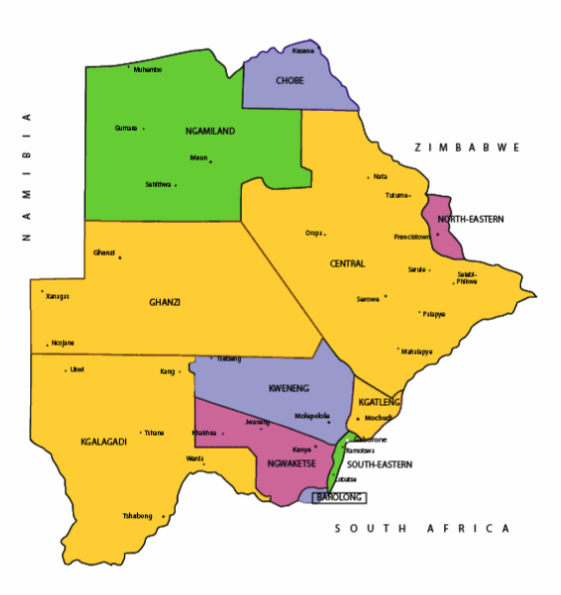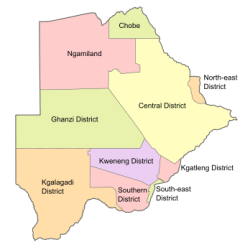Places and their polling stations in Tonota, Botswana
111 Tonota Central
0570 Molebatsi Kgotla (Tent)
0571 Tonota Primary School
0572 Tonota Main Kgotla (Old Shelter)
0573 Kweneng Kgotla
112 Tonota East
0574 Madisakwane Primary School
0575 Gulushabe Mobile Clinic (Tent)
0576 Goo-Kgari (Tent)
0577 Tlapa-La-Dipoo (Tent)
0578 Spiritual Healing Church
0579 Seroto Kgotla
113 Tonota South East
0580 Kgosi Sekoko Primary School
0581 Tonota College of Education
0582 Makomoto Mobile Clinic (Tent)
0583 Diolo-Machena (Tent)
0584 Foley Kgotla (Tent)
0585 Mabole (Tent)
0586 Mhakamme Kgotla
114 Tonota West
0587 Roman Catholic Church (Tent)
0588 Shashe SSS
0589 John Phooko Primary School
0590 Masedi Primary School
0591 Rutwang JSS
0592 Dibongwane
0593 Rauwe Primary School
0594 Head Mountain Apostolic Church
115 Tholodi
0595 Tholodi Primary School
0596 Tonota JSS
0597 Leomboko Kgotla
0598 Africa Evangelical Church (AEC) – Mission
0599 Open Space Next To Peculiar Investments
116 Semotswane
0600 Semotswane Primary School
0601 Semotswane Main Kgotla (Tent)
0602 Africa Evangelical Church (AEC)
117 Mandunyane
0603 Mandunyane Primary School
0604 Maseka Kgotla (Tent)
0605 Moshamo (Tent)
0606 Thakadiawa (Tent)
0607 Sepalola (Tent)
0608 Mandunyane Kgotla
118 Shashe-Mooke
0609 Mphane (Tent)
0610 Shashe Mooke Main Kgotla (Shelter)
0611 Shashe Mooke Primary School
0612 Setambole Kgotla (Tent)
0613 Tholo VDC Hall
119 Mabesekwa
0614 Mabesekwa Kgotla (Shelter)
0615 Gamgoree Mobile Health Stop (Tent)
0616 Nthelolang Cattle Post
0617 Thutse Well
0618 Mabesekwa Primary School
Reference: iec.gov.bw/index.php/electoral-districts/polling-stations.html
Botswana
Botswana is a country in Africa. It is topographically flat, with approximately 70 percent of its territory being the Kalahari Desert.
It is bordered by South Africa to the south and southeast, Namibia to the west and north, and Zimbabwe to the northeast.
Capital: Gaborone
Currency: Botswanan Pula
Official language: English
Population: 2.588 million (2021) World Bank
Dialing code: +267
Gross Domestic Product: 17.61 billion USD (2021) World Bank
Botswana’s ten districts are:
- Southern District
- South-East District
- Kweneng District
- Kgatleng District
- Central District
- North-East District
- Ngamiland District
- Kgalagadi District
- Chobe District
- Ghanzi District
Botswana’s councils created from urban or town councils are: Gaborone City, Francistown, Lobatse Town, Selebi-Phikwe Town, Jwaneng Town, Orapa Town and Sowa Township.






The name Botswana refers to ‘Land of the Tswana’. The landlocked, Southern Africa country is officially known as the Republic of Botswana.














Botswana is connected to Zambia through the Kazungula Bridge making it the world’s shortest border between two countries.
A country of slightly over 2 million people (2021), Botswana is one of the most sparsely populated countries in the world. It is essentially the nation state of the Tswana ethnic group, who make up 79% of the population.

About 11.6 per cent of the population lives in the capital and largest city, Gaborone.
Formerly one of the world’s poorest countries—with a GDP per capita of about US$70 per year in the late 1960s—it has since transformed itself into an upper-middle-income country, with one of the world’s fastest-growing economies.


The Tswana ethnic group were descended mainly from Bantu-speaking tribes who migrated southward of Africa to modern Botswana, living in tribal enclaves as farmers and herders.




In 1885, the British colonised the area and declared a protectorate under the name of Bechuanaland.
As colonisation stopped, Bechuanaland became an independent republic under its current name on 30 September 1966.


Since then, it has been a representative republic, with a consistent record of uninterrupted democratic elections and the lowest perceived corruption ranking in Africa since at least 1998.

The economy is dominated by mining and tourism. Botswana has a GDP (purchasing power parity) per capita of about $18,113 as of 2021, one of the highest in subsaharan Africa.


Botswana is the world’s biggest diamond producing country.
Its relatively high gross national income per capita gives the country a high standard of living and the third-highest Human Development Index of continental Sub-Saharan Africa (after Gabon and South Africa).
The country has been adversely affected by the HIV/AIDS epidemic. In 2002, Botswana began offering anti-retroviral drugs (ARVs) to help combat the epidemic.
Botswana is a member of the Southern African Customs Union, the Southern African Development Community, the Commonwealth of Nations, and the United Nations.
